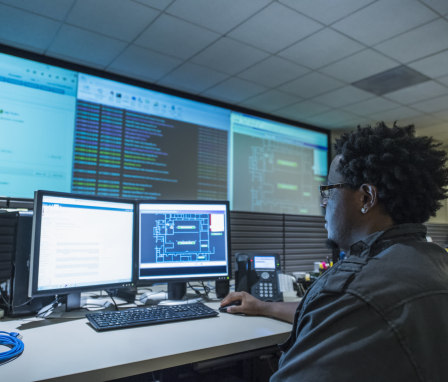 Credit: Erik Isakson / DigitalVision / Getty Image
Credit: Erik Isakson / DigitalVision / Getty Image
Security administrators are key members of cybersecurity teams that work to protect organizations' computer systems. Like many other cybersecurity careers, the well-paid role remains in high demand.
Cybersecurity Ventures reported a 350% increase in vacant cybersecurity jobs from 2013-2021. Their findings also noted a critical shortage in the United States, which has generally led to increased pay rates for qualified professionals.
This guide explores a typical day in the life of a security administrator in detail. The following sections focus on day-to-day security administrator duties, along with common job settings and tips on how to enter this fast-growing career path.
What Is the Job Description Of a Security Administrator?
Hacking and other forms of unauthorized system access have been a part of computing since its earliest beginnings. The cybersecurity field began to emerge in the 1970s as a response to these attacks. At the time, computer technology was developing quickly, and many businesses and government agencies had adopted security efforts.
The security administrator role evolved as cybersecurity matured into an important field. Security administrators hold mid-level positions on cybersecurity teams. Most of their duties revolve around setting up, managing, and updating their employer's cybersecurity tools.
In some settings, security administrators are the next level up from security analysts. In smaller organizations with fewer people on their cybersecurity teams, administrators may also perform analyst tasks.
Security administrator positions sometimes appear under other names, like network security engineer or security specialist. They are also called information security managers and information systems security officers.
What a Security Administrator Does
In most cases, a security architect designs an organization's cybersecurity systems and policies. Security administrators may help with design duties, but they generally implement the strategies created by team leaders.
CompTIA describes security administrators as entry-level or mid-level cybersecurity team members. They primarily install and manage the technical tools in their employers' cybersecurity programs. Security administrators also troubleshoot and correct issues with these tools, write policy documents, and train other employees to follow best practices.
Successful security administrators share several qualities that serve other cybersecurity professionals, as well. These include advanced technical knowledge, sound ethics, and a commitment to ongoing learning and development. Security administrators also require strong attention to detail and problem-solving skills.
The day-to-day of a security administrator, described in detail in the section below, also poses challenges. Their work often involves long, stressful workdays. The ongoing shortage of cybersecurity workers also forces many employees to take on extra duties.
Main Duties of Security Administrators
Nonstandard Duties for Security Administrators
A Typical Day for a Security Administrator
A typical day in the life of a security administrator differs based on the employment setting. Some administrators hold full-time positions in companies or public-sector agencies. Others work for technical consulting firms and engage with many clients over a day.
A security administrator working full-time for a single employer often spends much of their day on technical tasks. These duties mainly include developing, testing, maintaining, and updating security tools. Security administrators may also monitor traffic alongside security analysts.
Some security administrators double as analysts in smaller organizations with limited cybersecurity budgets. In these cases, administrators spend more time on analytical tasks like traffic monitoring and vulnerability testing.
Administrators working for consulting firms often spend most of their time on infrastructure tasks in server environments. These professionals mainly work remotely to service clients' system monitoring and information security needs.
As with many other cybersecurity roles, security administrators often work long hours. Atypical work hours may also factor into their daily duties, typically for administrators who work for consulting firms in different time zones.
Where Security Administrators Work
The U.S. Bureau of Labor Statistics (BLS) groups security administrators in its category of information security analysts. According to the BLS, information security analysts' top industries of employment in 2020 were:
Computer systems design and related services accounted for 26% of the 141,000 U.S. infosec analyst jobs Finance and insurance (18% of jobs) Information (10%) Enterprise management (9%) Administrative and support services (5%)
The BLS also tracks the percentage of information security analysts working in specific industries. From this viewpoint, the top five U.S. industries as of May 2021 were:
Meanwhile, BLS geographic profiles for infosec analysts cited these five states as the top employers as of May 2021:
Notably, Virginia and Maryland are close to Washington, D.C. This reflects the large numbers of information security professionals working for federal agencies. The public sector is a major employer of security administrators and other cybersecurity specialists.
Private-sector employers engaged in activities involving large volumes of sensitive data also have increased cybersecurity needs. In addition to financial services firms, these also include healthcare and education organizations.
Should You Become a Security Administrator?
A typical day in the life of a security administrator can be demanding. People who succeed in the role are passionate about their work and committed to ongoing professional development, which may include earning relevant certifications.
Security administrators hold mid-level roles in cybersecurity teams. Many administrators advance into their positions after gaining experience in entry-level roles.
Cybersecurity careers attract candidates because of the high pay and strong demand. They may fail to realize the extent of technical knowledge and work required for success in the sector.
If you are tech-savvy with a knack for designing solutions to complex problems, then a career in cybersecurity may be a good match. However, remember that the role may include high-stress work with long days.
Professional Spotlight: Michael Silbernagel
What's a typical day like for you?
Every day is different in my role as a senior security analyst/lead. It's a challenging, dynamic, and exciting position in the cybersecurity environment. No two days are ever the same, and there is always something new to learn.
What other teams do you work with on a regular basis?
At SysGen, there are ample opportunities for cross-functional work and collaboration with other teams. For example, I regularly work with our cybersecurity incident response, escalations group, infrastructure solutions, service delivery, digital advisory, sales and marketing, and executive/senior management teams.
Is there a lot of collaboration in your security administrator role?
Yes. Most of my work is collaborative and involves different individuals and teams.
Do you work in an office or from home (or a hybrid)?
SysGen is an advocate of the modern workplace. Because of this, I can benefit from a hybrid work environment and spend most of my time working remotely.
“If you are passionate about technology, securing critical infrastructure, willing to work hard, and want to help people, then a career in cybersecurity may be the answer for you.”
—Michael Silbernagel, Senior Security Analyst
What's your favorite part of working in this role? The most challenging part?
My favorite part of my work is the flexibility of working from anywhere and the opportunities to mentor our security team members.
The most challenging part of my role is when a non-client organization reaches out with a request for assistance with a breach. These situations are tricky because when this happens, we have zero visibility into their environment. After all, they're not our client. So before we tackle the breach, we may need to familiarize ourselves with their environment first, which might require more resources.
Any other insights about your day to day in security administration that may help people considering this career path?
There is a great demand for cybersecurity professionals worldwide. If you are passionate about technology, securing critical infrastructure, willing to work hard, and want to help people, then a career in cybersecurity may be the answer for you.
For whom do you think this career is a good fit? Why?
Cybersecurity requires flexibility and creative thinking. Dynamic and creative problem-solvers who are willing to work hard and have a passion for technology and helping people would be ideal for a career in this field.

Michael Silbernagel
Michael Silbernagel is the senior security analyst at SysGen, a client-focused IT consulting organization for small and mid-sized businesses. Michael is the cybersecurity consulting and incident response team leader and created SysGen's Enhanced Security Services — a holistic and comprehensive cybersecurity offering focusing on people, technology, policy, and process.
He is a lifelong technology enthusiast, passionate about cybersecurity, cloud computing, IoT, and blockchain, with over 20 years of industry experience in both the public and private sectors.
Michael holds a bachelor of science degree in computer information systems. He is a certified information systems security professional and a certified cloud security professional.
How to Prepare for a Career as a Security Administrator
Aspiring security administrators can follow multiple paths to prepare for their careers. Employers' requirements vary, but many prefer or require degrees in computer science or related fields for entry-level jobs.
An associate degree may open doors to some roles. However, companies often look for applicants with bachelor's degrees or higher when filling positions with advancement potential.
Hiring managers sometimes value hard technical skills over degrees. You can acquire these skills through cybersecurity bootcamps or self-directed education. It may also help to validate your abilities by earning industry-standard cybersecurity certifications.
If you are considering a career change into cybersecurity, part-time degree programs and bootcamps offer added flexibility. These options allow you to build knowledge without having to work around full-time weekday class schedules.
Learn More About Security Administrators
FAQ About the Day to Day of Security Administrators
What does a security administrator do on a daily basis?
Core duties include developing, installing, updating, and troubleshooting the tech tools that protect networks and databases. Security administrators also develop cybersecurity policies and ensure compliance.
Is the day to day of a security administrator stressful?
Industry research suggests that many cybersecurity professionals become stressed or burned out by their jobs over time. Increased stress levels generally correlate with higher levels of responsibility. Security administrators occupy mid-level roles, which may leave them prone to these pressures.
Does a security administrator need to know how to code?
Some security administrators develop custom cybersecurity tools and solutions in-house. A strong working knowledge of programming languages like C, Python, JavaScript, PHP, and SQL may be an asset.
What is the most rewarding part of working in security administration?
In 2020, Synopsys polled nearly 900 cybersecurity professionals to ask what drew them to the profession. The "ability to help people" was the top answer, followed by "[job] stability and growth" and "interesting challenges."
Recommended Reading
Take the next step toward your future.
Discover programs you’re interested in and take charge of your education.
